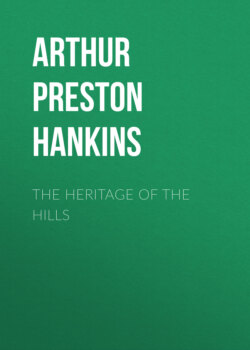Читать книгу The Heritage of the Hills - Arthur Preston Hankins - Страница 10
На сайте Литреса книга снята с продажи.
THE FIRST CALLER
ОглавлениеTable of Contents
Toward noon Poche was carefully feeling his way down the rocky cañon of Clinker Creek, over a forgotten road. Oliver walked, for Poche needs must scramble over huge boulders, fallen pines, and tangles of driftwood. The road followed the course of the creek for the most part, and in many places the creek had broken through and washed great gaps.
But the country was delightful. Wild grapevines grew in profusion at the creekside, gracefully festooned from overhanging buckeye limbs. Odorous alders, several varieties of willow, and white oak also followed the watercourse; and up on the hills on either side were black oaks and live oaks, together with yellow and sugar and digger pines, and spruce. Everywhere grew the now significant poison oak.
Finally Poche scraped through chaparral that almost hid the road and came out in a clearing. Oliver at last stood looking at his future home.
A quaint old cabin, with a high peaked roof, apparently in better repair than he had expected, stood on a little rise above the creek. The cañon widened here, and narrowed again farther down. The creek bowed and followed the base of the steep hills to the west. A level strip of land comprising about an acre paralleled the creek, and invited tillage. All about the clearing, perhaps fifteen acres in area, stood tall pines and spruce, and magnificent oaks rose above the cabin, their great limbs sprawled over it protectingly. Acres and acres of heavy, impenetrable chaparral covered both steep slopes beyond the conifers.
For several minutes Oliver drank in the beauty of it, then heaved himself into the saddle and galloped to the cabin over the unobstructed land.
He loosed Poche when the saddle and bridle were off, and the horse eagerly buried his muzzle in the tall green grass. Up in the branches paired California linnets, red breasted for their love season, went over plans and specifications for nest-building with much conversation and flit-flit of feathered wings. Wild canaries engaged in a like pursuit. Overhead in the heavens an eagle sailed. From the sunny chaparral came the scolding quit-quit-quit of mother quail, while the pompous cocks perched themselves at the tops of manzanita bushes and whistled, "Cut that out! Cut that out!" All Nature was home-building; and Oliver forgot the loss of the fortune he had expected at his father's death and caught the spirit.
He collected oak limbs and built a fire. He carried water from the creek and set it on to boil. While waiting for this he strolled about, revelling in the soft spring air, fragrant with the smell of wild flowers.
That the cabin had been occupied often by hunters and other wanderers in the cañon was evidenced by the many carvings on the door and signs of bygone campfires all about. He stepped upon the rotting porch and studied the monograms, initials, and flippant messages of the lonely men who had passed that way.
"All hope abandon, ye who enter here" was carved in ancient letters just under the lintel of the door. Next he was informed that "Fools names, like their faces, are always seen in public places." "Only a sucker would live here" was the parting decision of some disgruntled guest. "Home, Sweet Home" adorned the bottom of the door. One panel had proved an excellent target, and no less than twenty bullet holes had made a sieve of it. "Welcome, Wanderer!" and "Dew Drop Inn" and "Though lost to sight to memory dear" occupied conspicuous places. Then on the right-hand frame he noticed this:
The carving was neatly executed. The leaves represented were indisputably those of the poison oak.
Had some one carved this in a jocular effort to warn chance visitors to the place of the danger of the poison weed? Or did the carving represent the emblem of the Poison Oakers?
Oliver smiled grimly and opened the door.
He passed through the three small rooms of the house and investigated the loft. The structure seemed solid. A new roof would be necessary, and new windows and frames and a new porch; and as Oliver was no mean carpenter, he thought he could make the cabin snug and tight for seventy-five dollars.
The front door had closed of itself, he found, when he started back to his campfire. He stopped in the main room, and a smile, slightly bitter, flickered across his lips. As neatly carved as was the symbol of the Poison Oakers outside—if that was what it was—and evidently executed by the same hand, was this, on the inside of the door:
